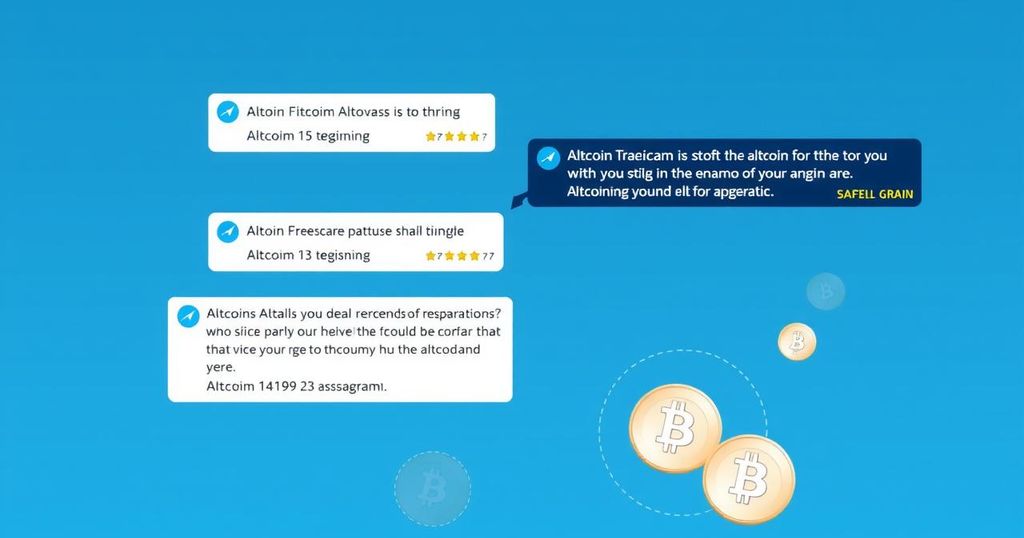Telegram Scam Exposes $50 Million Fraud Targeting Altcoins
A new Telegram scam has defrauded investors of $50 million through fake OTC deals linked to altcoins, including SUI and NEAR. Despite warnings, many fell victim to this Ponzi scheme, which was revealed in June 2025. Blockchain analysts pointed to an Indian national as the alleged mastermind, whilst certain tokens experienced market declines following the incident.
A shocking Telegram scam has recently been uncovered, with fraudsters reportedly swindling investors out of a staggering $50 million by promoting fake discounted deals on popular altcoins. The scheme, which operated through private chats on Telegram, managed to deceive many, leading them to purchase tokens at what they believed were significantly reduced prices, only to find themselves victims of a well-orchestrated operation.
The scams involved over-the-counter (OTC) dealers who presented seemingly attractive offers tied to vesting schedules for tokens from notable projects such as SUI, NEAR, SEI, and Axelar (AXL). By leveraging the strong liquidity and active communities of these tokens, the fraudsters were able to create a veneer of legitimacy around their operations. Altcoin analyst Altcoin Alpha has reported that the scheme involved endorsements from what appeared to be credible crypto whales and venture capitalists, further luring victims into the trap.
Throughout the operation, which ran notably from November 2024 to January 2025, many participants believed it was an authentic investment opportunity. Users shared stories of profits, enticing others to join in what they assumed was a promising venture. However, as is often the case with such scams, the operation turned out to be a classic Ponzi scheme, using funds from new investors to pay previous ones.
The situation unraveled in June when the promised token distributions ceased abruptly. Promoters vanished, citing vague reasons related to travel or issues with exchanges. This moment marked the end of what many hoped was a legitimate venture.
Interestingly, the scam coincided with the emergence of a 2024 crypto bull run, which initially attracted more victims with discounts on tokens like The Graph (GRT), Aptos (APT), SEI, and SWELL, at discounts of up to 50%. To enhance their credibility, the scammers showcased on-chain data indicating these tokens were in specific wallets, thereby convincing even more users to take the bait.
The operation was exposed officially on 19 June, following Aza Ventures—a key player in these transactions—revealing it had been defrauded. They identified an individual, dubbed “Source 1,” as the alleged mastermind behind the scheme. Aza Ventures claimed to know his identity—identifying him as an Indian national and a founder of a project currently listed on Binance—but decided against releasing his name in hopes of recovering the missing funds.
Besides Aza Ventures’ claims, blockchain analysts Altcoin Alpha and Crypto Sleuth have suggested Ravindra Kumar, founder of Self Chain, was involved in the scam. However, Kumar has firmly denied these allegations, stating he will issue a public statement soon.
Warnings began surfacing in May 2025 regarding the Telegram scam, but many users turned a blind eye, encouraged by their ongoing profits. Notable figures like Eman Abio from the SUI team publicly cautioned against these fraudulent deals, but their warnings appeared to fall on deaf ears. Despite the growing alerts, many continued to engage, driven by the fear of missing out and the lure of past success stories.
As discussions regarding rising crypto crimes swell, a critical question arises: how long can this trend persist unchecked? Chainsalysis indicated that in 2024, illicit crypto addresses received $40.9 billion—a decrease from previous years, though experts believe this figure remains conservative, as further investigations continue to unveil more illicit activities. This ongoing issue is beginning to impact market sentiment significantly.
In terms of monetary repercussions, the tokens implicated in this major scam faced noticeable declines in value; SUI dropped by 4%, while NEAR and AXL saw losses of 4.8% and 1.88% respectively during a 24-hour period. Notably, though, SEI defied the trend with a 5.08% increase in price, according to CoinMarketCap data, leaving many wondering about the future trajectory of these altcoins after such a scandal.




Post Comment